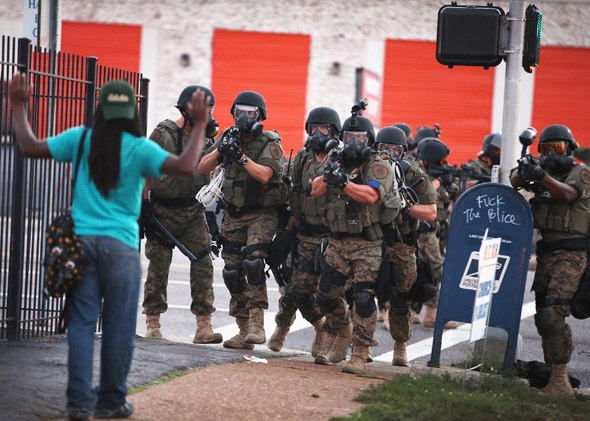| « 18 Groups to Participate in Placemaking Challenge | Confessions of a Feminist Asshole » |
Op-Ed Thu Aug 14 2014
Ferguson Saw Rioting; When Will Chicago?
In Chicago, we have not seen riots since the assassination of Martin Luther King, Jr. in 1968. During those riots, one event -- Dr. King's death -- sent black Chicagoans over the edge. Yet it was not this tragedy in isolation that caused black Chicagoans to take to the streets and commit violent and destructive acts. Rather, it was the history and continued reality of violence and oppression they had faced here ever since the first black Americans began to move en masse to Chicago during the Great Migration.
On Sunday night Ferguson, Missouri (a St. Louis suburb) saw riots and looting. Like the MLK riots in Chicago, the rioting was set into motion by another devastating death -- the police killing of Michael Brown just days before he was supposed to begin college. And just like in Chicago, it was not this one event alone that caused the protests. Rather Brown's death was a tipping point. It was too much for people who have been systematically oppressed and dehumanized to take sitting down.
In many critical ways, black residents of Chicago are no better off than they were in 1968. The city is basically just as segregated, and poverty, unemployment, failing schools and violence are still concentrated in the same black neighborhoods.
At the same time, instead of supporting the community, the police in black neighborhoods are highly militarized to the point of alienating and scaring residents. Law enforcement here and elsewhere consistently targets rather than protects black neighborhoods, which is evidenced by the disproportionate number of black Americans in prison. A recent study by the ACLU found that it is now commonplace for police to treat "civilians as wartime enemies" and force their way into homes with SWAT teams for simple drug busts.
Violence breeds violence. And violence can be the outright murder of an unarmed black teenager by a police officer. But violence can take more subtle forms. It also occurs when the police throughout Illinois are four times more likely to conduct vehicle searches of black and brown-driven cars than they are white, even though they find contraband materials in the cars of twice as many white drivers. In Ferguson, as in many cities throughout the country, police commit the same sort of racial profiling. Both of these forms of violence result from the same mindset, which dehumanizes and thus devalues black lives. It happens in small ways all the time, and explodes into larger acts of concrete violence such as Brown's death.
Yet while Chicago faces many similar conditions, unlike Ferguson, the city has not seen riots in nearly 50 years.
When the officer shot him, Brown was unarmed and witnesses reported he was holding up his arms to surrender. Afterwards, the police left his bloodied and bullet-ridden body out on the street for hours for the neighborhood to see.
After the news of Brown's murder spread, residents took to the streets, rioting and looting. Since Sunday night, the rioting has given way to peaceful protests. This is admirable, and violence should never be a solution. Yet when I heard the news of the riots, my reaction was not surprise that this was happening, but rather surprise that it does not happen more often. It should not be startling that black people in communities such as Ferguson, who are constantly oppressed and see no justice when their children are killed, would take to the streets.
In fact, what is surprising is that people are not rioting in cities throughout the country. It is by no means unusual news that law enforcement officials kill black men rather than using other available measures. In fact, Brown was the fourth unarmed black man to be killed by law enforcement this month in the US.
Ferguson has quickly become a symbol of everything that is wrong with the American policing system and the systematically racist way in which our laws are enforced. Yet the reality is that Ferguson could have been any poor, black neighborhood in the country.
Chicago is about one third black, and Ferguson is about two thirds. The police are supposed to serve and protect the entire community, not terrorize a significant portion of it. The images of police officers outfitted for a war zone rather than a peaceful protest have been deeply disturbing. And it is simply outrageous that a police officer would go straight to shooting an unarmed teenager without taking any other actions to subdue him, if he was truly a threat (which is not even clear at this point). Sadly, this extreme police militarization has become a norm in in black communities throughout America.
I don't think anyone believes this would have happened to a young white man in Clayton, a wealthy white suburb of St. Louis. Yet I think we can all see that something like this is just waiting to happen in a neighborhood such as Englewood or West Garfield Park in Chicago.
So the question we should be asking is not why are people in Ferguson furious and why did that anger spill over into rioting and looting. Instead, we should be asking: Why would we expect any community to take that treatment lying down? And when will something happen that will be a tipping point in our own community? Unless something changes, we cannot honestly claim that in many ways we are not setting the stage for riots in Chicago and throughout the country. And when that happens, who will we truly have to blame but ourselves? But society as a whole?













Anon / August 14, 2014 3:59 AM
RIP MIKE BROWN